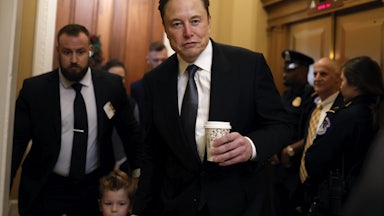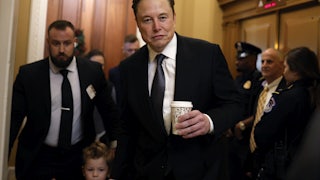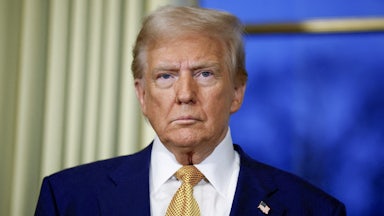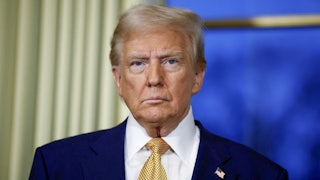On June 29, shortly after the Supreme Court overturned Roe v. Wade, a small group of protesters swarmed the entry to an event held by the New York City Lawyers Chapter of the Federalist Society. The point of the exercise, said protest organizers, was to give the Federalist Society “a taste of what it’s like to be a patient entering an abortion clinic in the U.S.” Whether the protesters succeeded in this mission is hard to say. But they deserve credit for understanding where power in America now resides.
Most Americans likely have only a passing familiarity with the Federalist Society, Yet all six of the “conservative” justices on the Supreme Court are current or former members. And the agenda that they advanced in what was perhaps the most shocking week in Supreme Court history—depriving women of their rights to bodily autonomy, ensuring that handguns may proliferate without the encumbrance of state safety regulations, crippling the ability of federal regulators to address climate change, and licensing the promotion of sectarian religion at public expense—reflects the Federalist Society’s agenda.
Many Americans are apt to lay the blame for the radical turn in the American legal and political system on former President Donald Trump. But in some ways Trump was just a front man—a useful tool for a new and radicalized conservative movement. This movement has no single leader, but it does have power brokers who bring the relevant parties together. Among the most prominent is Leonard Leo, the longtime executive vice president of the Federalist Society. Leo has shuffled his titles in the past year, but he’s still in the game, and the Supreme Court’s week of horrors is best understood as the starting point rather than the culmination of what he has in mind for the future of the United States.
The Federalist Society’s leading role in the conservative movement started not long after the election of former president Bill Clinton. Leo, a Catholic ultraconservative, came to the conclusion that righteous religion would never win at the ballot box. He was certain that the public, in his view seduced by the shallow values of a liberalizing culture, would not voluntarily submit to the necessary dose of moral medicine needed to save the nation. The last best chance to rescue civilization, he concluded, was to take over the courts. If activists could funnel just enough true believers onto the bench, especially onto the Supreme Court, they just might be able to reverse the moral tide.
“He figured out 20 years ago that conservatives had lost the culture war,” said Leo’s former media relations director, Tom Carter. “Abortion, gay rights, contraception—conservatives didn’t have a chance if public opinion prevailed. So they needed to stack the courts.”
Leo’s other critical insight was that, despite the popular perception that the American judicial system operated at a level above the base concerns of partisan politics, it was in fact money that made the courts go round. Early in his legal career—even as a young legal scholar—he understood that a marriage between big money and hard religion could be brokered and an alliance could be built to transform the courts. This has been his life’s work.
While studying law at Cornell, Leo founded a student chapter of the Federalist Society. In 1991, he went to work for the organization’s national office in Washington, D.C. There, he set about building up a conservative legal movement, forging alliances with prospective jurists and Republican leaders. Thanks to early funding from right-wing donors including the John M. Olin Foundation, the Scaife Foundation, and the free-market think tank Institute for Economic Affairs, the organization emerged as a vital career center for the conservative young ideologues of the legal world, where undistinguished academic records might be forgiven provided an unwavering commitment to the cause could be verified.
The best of the young talent was meticulously groomed through a program of rotating internships, clerkships, and interim appointments to the welcoming offices of plutocrat-funded think tanks and legal advocacy groups—“the carefully manicured terrarium of the conservative legal community,” as the journalist Charles P. Pierce has described it. “Federalist Society member? Check. Clerkships for conservative Supreme Court Justices? Check.… Wingnut culture-war bona fides? Check.”
When George W. Bush was elected president, Leo began working as an outside adviser. According to a 2003 email by a White House aide that was sent to, among others, Brett Kavanaugh, Leo was characterized as a point person for “all outside coalition activity regarding judicial nominations.” He became known as a moneyman who could be relied upon to drum up funding for promotional activities on behalf of judicial appointees, providing media training for key pundits or creating grassroots support through advertising campaigns and other means. He also joined the boards of various right-wing and conservative religious organizations, including the Catholic Association Foundation, which funded campaigns to oppose same-sex marriage, and Reclaim New York, whose directors included then–Breitbart News chairman Steve Bannon and his billionaire backer, Rebekah Mercer.
The Mercer family became major Federalist Society backers, too, donating nearly $6 million over a span of several years, according to The Washington Post. But even these munificent gifts were dwarfed by other contributions, often from unknown donors. Leo has advised or helped run over two dozen nonprofits, including the Freedom and Opportunity Fund, the BH Fund, and America Engaged. In 2016 and 2017, those three nonprofits, all of which named Leo as president in their tax filings, took in approximately $33 million.
One of Leo’s guiding principles was a commitment to end abortion. The conservative legal activist Ed Whelan wrote, “No one has been more dedicated to the enterprise of building a Supreme Court that will overturn Roe v. Wade than the Federalist Society’s Leonard Leo.” At a 2017 presentation at the Acton Institute outlining the Federalist Society’s strategy to remake the federal judiciary, Leo said, “I would love to see the courts unrecognizable.” Trump, he commented, is “the change we’ve been waiting for.”
In addition to advising Trump on his judicial picks—Senator Sheldon Whitehouse asserts that nearly 90 percent of Trump’s appellate court nominees were or are Federalist Society members—Leo and his allies raised hundreds of millions of dollars. Between 2014 and 2017, they hauled in over $250 million, according to the journalist Robert O’Harrow, writing for The Washington Post. The money was used in part, according to O’Harrow, to promote conservative policies, provide funding for right-wing TV pundits, and coordinate and finance campaigns for their judicial picks.
Leo’s work builds on that of other great minds of the Christian right’s legal juggernaut. In 1994, the Alliance Defense Fund (now Alliance Defending Freedom), or ADF, was launched with the support of some of the heaviest hitters of the new Christian right, including D. James Kennedy, founder of Coral Ridge Ministries; James Dobson, founder of Focus on the Family; Bill Bright, founder of Campus Crusade for Christ International (now Cru); Donald Wildmon, president of the American Family Association; and others. The ADF secures its backing from financial heavyweights of the movement—among them the Edgar and Elsa Prince Foundation, the Bill and Berniece Grewcock Foundation, and the Richard and Helen DeVos Foundation. It also receives substantial funding from the National Christian Foundation, a “donor-advised fund” that raised $2 billion in 2020, according to its financial reports.
Today, with an annual revenue of close to $60 million, the Alliance Defending Freedom is a mainstay of the Christian nationalist movement’s plans for dismantling the wall of separation between church and state. Its trophies include: Masterpiece Cakeshop v. Colorado Civil Rights Commission; Burwell v. Hobby Lobby Stores, Inc.; Zubik v. Burwell; Citizens United v. Federal Election Commission; Trinity Lutheran Church of Columbia, Inc. v. Comer; and Good News Club v. Milford Central School.
Joining the ADF are a number of other legal advocacy groups with largely overlapping agendas. Jay Sekulow, who served as one of President Trump’s counsels, helped Pat Robertson form the American Center for Law and Justice, or ACLJ, in 1990 with the idea of creating a right-wing alternative to the ACLU. In 1989, Mathew D. (“Mat”) and Anita Staver established Liberty Counsel, which frequently shows up alongside the ADF and ACLJ in court. Becket, formerly known as the Becket Fund, and the Thomas More Society also frequently take the lead or lend support to such cases.
First, Liberty recently won two cases before the Supreme Court: Carson v. Makin and Kennedy v. Bremerton School District. Other organizations include the Pacific Justice Institute, the Freedom of Conscience Defense Fund, the National Legal Foundation, and the Christian Legal Society. Altogether these right-wing legal advocacy groups have combined budgets of close to $100 million per year.
The ADF and its allies are as radical as they
are rich. Alan Sears, who led the Alliance Defending Freedom for over two
decades, announced his vision in the title of the 2003 book he co-wrote with
Craig Osten, The Homosexual Agenda:
Exposing the Principal Threat to Religious Freedom Today. “The radical
homosexual activist community has adopted many of the techniques used in Nazi
Germany,” he wrote. The current president and CEO of the organization is
Michael P. Farris, founding president of both Patrick Henry College and the
Home School Legal Defense Association, which has cast efforts to introduce even
minimal regulations of homeschooling as tyranny.
Mat Staver of Liberty Counsel was just as quick to push the buttons of paranoia in his own 2004 book titled, Same-Sex Marriage: Putting Every Household at Risk. The Blackstone Institute, a learning center operated by the ADF to train up its army of lawyers, hopes to inspire a new generation of young attorneys. The organization has sought to “recover the robust Christendomic theology of the 3rd, 4th, and 5th centuries,” according to text that appeared on the website of the Blackstone Legal Fellowship, an ADF fellowship program, in 2014.
In the public perception, the judiciary strategy of the Federalist Society, the ADF, and their allies appears to be centered on the issues of abortion, LGBT rights, and “religious freedom.” In their own public relations messaging, the groups insist that their purpose is merely to defend “free speech” and the rights of persecuted Christians (along with the occasional token persecuted member of another faith). It would seem, however, the goal is to ensure that our laws and our government are shaped by their particular version of Christianity—and to demand public money for the purpose.
Following tortured legal theories enshrined in decisions such as the Good News Club v. Milford Central School, these legal activists assert that excluding churches and religious organizations from public funding is discrimination against their religious character. Under such a logic, of course, the Establishment Clause itself ceases to exist—or, rather, the government is effectively mandated to provide religious groups with public money, since failing to do so would amount to discrimination against their “religious viewpoint.”
But logic appears to have been one of the main casualties of ideology in the Supreme Court’s summer of radicalism. The conservative majority has slalomed around inconvenient precedents and traversed wild contradictions. It claims at one moment to revere “deeply rooted history” and then it peremptorily tosses history aside, as in West Virginia v. Environmental Protection Agency, when the court discarded long-held doctrine.
If the Supreme Court is playing Calvinball—the famous Bill Watterson creation where the rules are made up as you go along for the purpose of maximum advantage—it is doing so by design. This is the nature of the machine that Leonard Leo and the Federalist Society have created. The rhetoric is all about “original principles,” but the reality is all about money. When right-wing legal organizations walk into today’s courts, packed with Federalist Society allies, they know that the deck is often stacked in their favor. And knowing this, they’ve begun to seek ever more radical forms of redress from the judiciary. The ceiling of what’s permissible has yet to be reached.
One school of progressive thought says that America has devolved (once again, perhaps) into a plutocracy. The wealthiest people in America run the country, it is suggested. Another school of thought says that Christian nationalists are ascendant, and a theocracy is in the cards. In fact, both critiques have a point. Leo’s ultimate goal appears to be the permanent establishment of a pluto-theocratic ruling class in the United States. At the moment, he is winning.










